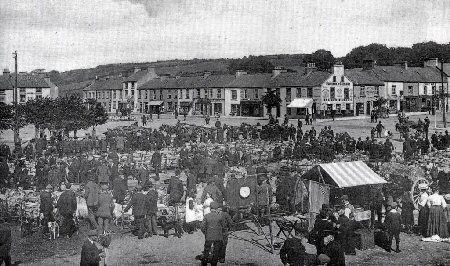Crossmaglen, or Cross as it is better known in the area, was the largest village in that part of the County. Its principal feature was its large square, reputedly the largest in
There was the chapel, school, police barracks, picture house, dance hall and football pitch. The village was not electrified until the 1950’s although the cinema had a generator.
Drumbally, comprising 265 acres, lies two miles from Crossmaglen and three miles from the borders with Co. Louth and Co. Monaghan. Drumbally lies on a large drumlin and from the top on a clear day, flat countryside stretches south for many miles into Co Louth. In common with most of the rest of the country, the townland suffered a decline in population during and after the Great Famine 1845 – 1848. From Census returns we know that from 144 people in 75 dwellings in 1841, the population steadily declined, by 1951, to 37 people in 14 dwellings – a 74% reduction.
At the time of the 1901 Census (the first one for which complete documentation survives) 11 of the 17 households contained at least one native Irish speaker – 13 in all. The average age of the group was 61; eldest 80, youngest 40. Drumbally had a significantly higher proportion of Irish speakers than the (civil) parish as a whole where 785 of 5249 (15%) spoke the language. When I arrived, 37 years later, most, if not all of this group would have passed on, taking with them a whole tradition.
The house where I was born and lived in until 1952, was a slated single storey, two-roomed cottage 50 yards down a sunken lane at the foot of Drumbally hill. It belonged to “James Pat” McShane who had emigrated. The rent was 1s 6d a week. There was a shed, a “street” (a clear area, or yard, in front of the house) and two “gardens”, one of which my father planted out in potatoes and vegetables each year.
When it rained, the water rushing down the lane in a torrent was an endless source of joy to me in setting up dams, making diversionary channels and generally getting wet through. I never remember the water as cold – it always seemed warm and fresh, with a feeling of newness, and promise, as it first rushed, and then trickled, over the stones. In the hard winter of 1947 the lane filled with snow and my father spent a whole day digging up to the road.
… more later …
For those of you who tire of my drip-feed methods (the Newry Journal style from the beginning) – you may read Pat’s memoirs complete here
… History: Town of Crossmaglen? …
